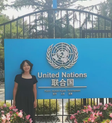Junshu CHEN (UNFPA China, 2018)
- Sep 14, 2018
- 3 min read
Updated: Aug 5, 2025
Name: Junshu CHEN
Bachelor of Arts, majoring in English Studies and Comparative Literature and minoring in Journalism
The University of Hong Kong
Position: Intern of Gender Programme of United Nations Population Fund (UNFPA)
Duration: June 2018 – September 2018 (3 months)
Sponsorship: United Nations Peace Development Foundation
The last three months of interning at UNFPA China office whiffed by. Having made personal contributions to so many projects of the office’s Youth Program during my internship, I already feel at home working with my colleagues at the office and communicating with a couple of close partners of the Program. In the course of learning while working, I have seen my personal development along the way and have gained a deeper insight into UNFPA’s areas of focus, its missions and vision, and of the presence of UN in China.
The work of the program officer is predominantly project-oriented, and each project has a different time period. In some cases, the deadline can be pressing; while in others, the projects last for one year or more. Coming from an academic background in English Studies, I initially found the central focus of the Youth Program on adolescent sexual and reproductive health an area of novelties. In practice, the projects span subject matters such as education, government and policy planning, public health and resource mobilization. The job nature requires certain professional knowledge but more importantly, transferrable skills across disciplines. Of all the projects I was involved in, the highlights are the two workshops with Dance4Life and CFPA and the lunch dialogues with SG’s envoy on youth at our office.
At the Dance4Life workshops, I was the interpreter between the Dutch social franchise company and the program officers from local FPAs in Hubei and Guangdong. The first kickoff workshop was to pave the way for the three-month program pilot in the two provinces, and the second was for discussion on the contextualization of the program guidebook. During the workshops, there were active exchanges and collisions of values, either conservative or liberal, on the program curriculum, which is designed to empower teenagers and help them make informed choices in puberty. While working with overseas partners from Amsterdam and Chinese program officers, I came to realize the vital importance of soft skills in the course of verbal translation—in my case, a translator can also be a facilitator. Language skills only come alive under the help of communication tactics, as the words need to be put in the context of the language to achieve full understanding.


My supervisor, together with the office, also assigned me the responsibility of hosting the lunch dialogue in our office between the UN SG’s Envoy on Youth and Chinese youth representatives. For the first time in my internship, I was put in charge of a crucial event down to every single detail. I took pains communicating with the participants and the residential coordinator’s office and managing the event logistics, from agenda to food. The event proved a great success in the end, under full support from the rest of the office; we had fruitful dialogues with the Youth Envoy, discussing youth development and participation, intergenerational dialogues and gender-based violence in a global and national context.

I am more than thankful to my supervisor and to the office in general for their entrusting me with countless responsibilities at work; these opportunities enabled me to gain rewarding hands-on experience and expanded my vision, motivating me to explore across various industries in my career decision-making. I have also taken up new outlook on the vital significance of transferrable skills and how they are able to leave defining marks on one’s professional qualification.
Coming to understand UN’s subtle role in juxtaposition to the government, I also realize that UN bears a special presence in China. As the UN agencies work with and around the Chinese government on social development issues, there are certainly areas of consensus as well as conflict, that’s why liaison and negotiation with the government body is of vital importance. For the UN agencies to run their missions of social development in the country, government recognition is a prerequisite, even when it is gained at the cost of a little compromise. Social changes come slow, but through the way UN works in China, I could see possible ways of penetrating different levels of power and that progress can be brought about in the long term.
In the past three months, I have witnessed my personal growth and intellectual development along the way, and I am contented to see myself making contributions, as trivial as they might be, to the wellbeing of youth in China. Proud to be part of the UNFPA team in China, I will perceive this experience as a chapter in my life which opens up possibilities of life that I could never have imagined.















































Comments